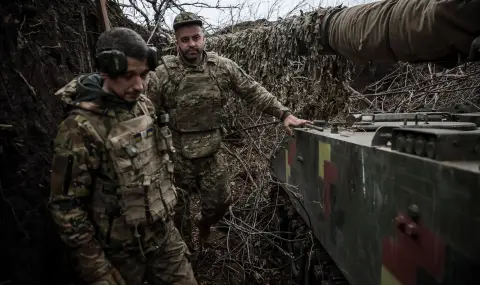At their summit in Washington last week, NATO countries made a number of promises to help Ukraine. These, it seems, will be enough for the country attacked by Russia to continue to resist, but not to defeat the invaders.
The meeting in Washington expectedly took place under the sign of the war in Ukraine. The Western military alliance has unveiled plans to step up its support for the former Soviet republic. Ukraine's path to NATO membership is irreversible, the leaders of the member countries announced, although they did not specify specific terms.
The meeting was heavy on promises, but light on plans, sums up the magazine "Foreign Policies".
The NATO allies, more specifically, made an official commitment to provide Ukraine with military aid in the amount of 40 billion euros next year. Twenty Western countries separately adopted a package of initiatives - the so-called Treaty on Ukraine.
This represents some progress compared to the previous NATO summit - in the Lithuanian capital Vilnius in July last year. Then Ukraine simply received promises of support and assurance that its future was in NATO. And now, however, specific terms were not given.
Among other measures adopted in Washington is the creation of an official NATO mission in support of Kiev: NATO Security Assistance and Training for Ukraine. It will be based in the city of Wiesbaden, in the central German state of Hesse, and will take over from the US-led Ukraine Contact Group to coordinate military aid to the attacked country.
NATO will also send its special representative to Kyiv, who will coordinate political and practical support for Ukraine on the ground. For now, it is not clear who will be appointed to the position, a spokesman for the alliance told DPA.
In addition, NATO countries will supply Ukraine with the American-made F-16 fighter jets it so desires.
All these measures underline efforts by the West to put aid to Kiev on a long-term basis, at a time when Russia shows little sign that its determination to bring the war to a successful end is weakening, according to "Foreign Policy" .
Unlike Vilnius a year ago, this time Kyiv welcomed the results of the meeting in Washington. "We are satisfied," said Andriy Yermak, Ukrainian President Volodymyr Zelenskyi's chief of staff, arguing that the alliance had made "real steps forward.
However, the meeting in Washington also exposed a key tension in the Western strategy in support of Ukraine: military aid played a crucial role in pushing back the Russian armed forces, but at the same time did not enable the Ukrainian army to win the war, notes the authoritative American edition.
"We basically support Ukraine to stay in the fight and make some progress, but not win outright,", commented Liana Fix, an expert on Europe at the think tank Council on Foreign Relations, quoted by "Foreign Policy" . She warns that "this is not a real strategy for war.
The Institute for the Study of War, however, cites estimates from representatives of the US and other Western countries that the Ukrainian armed forces will continue to be on the defensive for the next six months. According to these sources, cited by the American research institute, Ukraine will not be able to conduct a large-scale counteroffensive operation this year.
Countries on NATO's eastern flank, most notably the Baltic republics and Poland, have long called for increased support for Ukraine. Allies with the deepest pockets and most advanced weapons systems, first and foremost the United States, have, however, taken a more cautious approach in an effort to avoid a spiral of escalating tensions with Moscow, summarizes "Foreign Policy".
NATO has reaffirmed its support for Ukraine at a time when Russia is methodically destroying its energy infrastructure. On Monday last week - ahead of a NATO summit from Tuesday to Thursday - dozens of people were killed in one of the deadliest days of airstrikes carried out by the Russian military since the start of the war. A children's hospital in the capital Kyiv, where two people died, was also not spared.
NATO's new measures to support Ukraine were announced "at a critical time and will (help) prevent a worst-case scenario this year,", commented Michael Kofman, an expert on Ukrainian armed forces at the Carnegie Endowment for International Peace .
"The main priority of all these (announced measures), especially (for support in) the area of air defense, is to offset (Moscow's) clear advantage in (some) areas," said Eric Charamella, a former official of The US National Intelligence Council in charge of Russia.
On Tuesday, the first day of the NATO summit, US President Joe Biden announced that NATO allies are committed to providing Ukraine with dozens of air defense systems, including four Patriots.
"This is definitely necessary for Ukrainians to stop the bleeding and start rebuilding," commented Charamela, who is now a senior fellow at the Carnegie Endowment.
However, NATO representatives warned that the promises made at the meeting in Washington last week will not be enough for Ukraine to fundamentally change the situation on the battlefield.
"Ukrainians need more than what (we will provide) to win," told "Foreign Polisi" NATO Military Committee Chairman Rob Bauer. He agreed that coordinating training and meeting the operational needs of the alliance's future mission in Wiesbaden was important, but added that Kiev needed to provide more troops.
Russia's armed forces have recovered faster than expected from their surprisingly poor performance in the first months of the war and are quickly learning how to counter the high-tech new weapons systems being supplied to Ukraine by its Western allies, notes Foreign Policy. .
All these developments come at a time when Ukraine and Russia are locked in a deadlock, with each side hoping to break the other. More generally, in this war of attrition, public cohesion and the will to win in combination with military (and especially weapons and technological) potential and geopolitical developments and alliances will be decisive.
